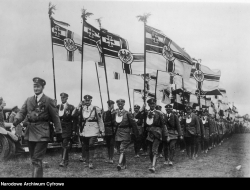In a 1933 speech, Winston Churchill lamented the rise of Hitler and warned about the dangers of unpreparedness before a potential world war. He compared the present situation to the tragic years leading up to Hitler’s World War, emphasizing the need for vigilance and readiness in the face of rising authoritarian threats. Churchill’s warning serves as a cautionary tale about the consequences of complacency and appeasement in the face of aggression.
Churchill’s speech highlighted the parallels between the political climate of the 1930s and the present day, pointing to the dangers of ignoring warning signs and failing to confront threats to democracy and freedom. He stressed the importance of learning from past mistakes and taking decisive action to prevent history from repeating itself. The rise of authoritarian leaders and the erosion of democratic norms are warning signs that must be heeded to avoid the mistakes of the past.
The failure to adequately prepare for the threat posed by Hitler in the 1930s led to a devastating world war that cost millions of lives and reshaped the global order. Churchill’s message serves as a reminder of the consequences of inaction and the importance of standing up to tyranny and aggression. The lessons of history must not be forgotten, and leaders must be willing to confront authoritarian regimes and defend democratic values in order to prevent another catastrophic conflict.
In conclusion, Churchill’s warning about the parallels between the present and the tragic years before Hitler’s World War serves as a reminder of the dangers of unpreparedness and appeasement in the face of authoritarian threats. The rise of authoritarian leaders and the erosion of democratic norms are warning signs that must be taken seriously in order to prevent history from repeating itself. Leaders must be vigilant, proactive, and willing to confront tyranny in order to safeguard democracy and ensure peace and stability in the world.









